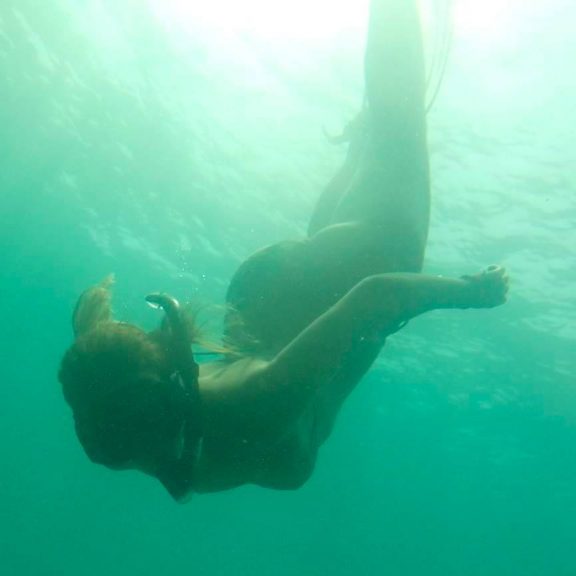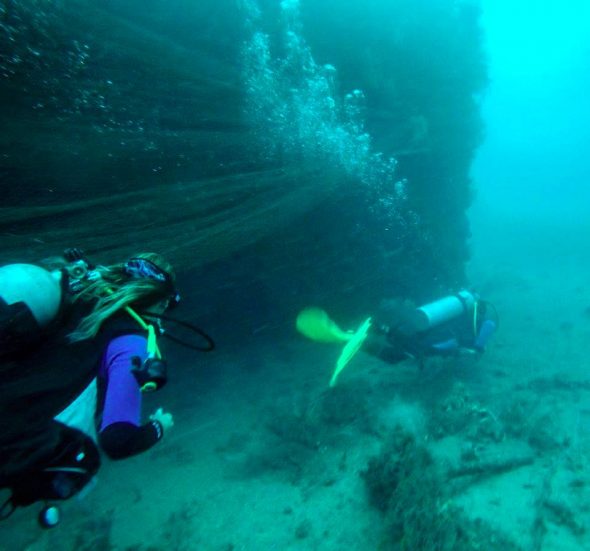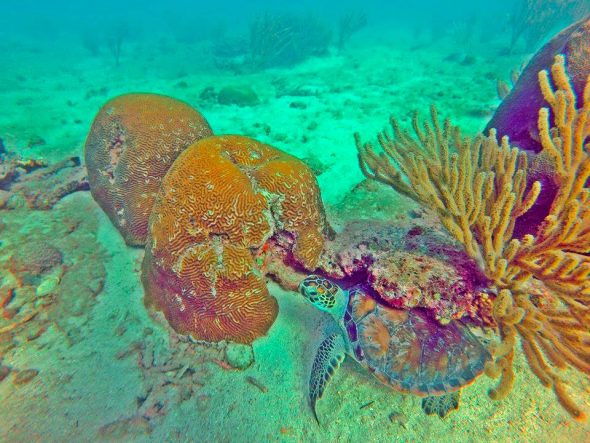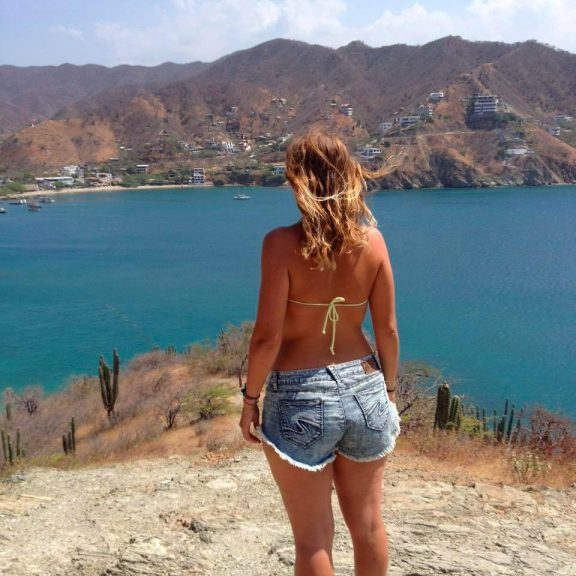

Yarn Registry BLOG – I just worked as a dive instructor in Colombia for six months.
- Published: August 5, 2016
Rachael Frances Smith has what probably 99 percent of the population would call a dream job – she just got done working as a dive instructor in a beach town in Colombia, where her day consisted of leading dives in the Caribbean. She lived within walking distance of the beach and was able to practice one of her foremost passions practically all day every day.
However, leading a group of divers is obviously a tall order. Smith was responsible for the wellbeing of relatively inexperienced divers many meters down in the ocean. Being able to do this job took many years of hard work and professional certifications, and the seriousness of her vocation is not something she takes lightly at all.
Smith talks below about her coursework, her many pounds of gear, and what it’s like to travel and get paid to do something you absolutely love. Her hard work in getting to this point is impressive, and her opportunities well deserved. Try not to get too jealous that a day in your job doesn’t begin with waking up in a cool apartment in another country and feature hammerhead sharks as part of the daily routine.
I’ve always been kind of a fish out of water, but diving is awkward. Even if you’re comfortable in water, breathing underwater is entirely unnatural for humans. It’s not something that’s normal for us to do. You lose a lot of your cues that make you act normally on land. The shadows are different, the density of your surroundings is different – it can be really hard to get your bearings and swim. But once you do, it becomes second nature. You can swim and control your movement and your buoyancy. It’s just a lovely thing to do. Plus you get exposed to all of these beautiful things underwater.
There are a number of scuba-certifying organizations. The most popular ones are SSI, NAUI, and PADI. They’re all basically the same until you get to the professional level, and then there are some slight differences. You need to know the same thing about physics, about equipment, the same skills underwater, all of it. They’re all transferable among one another – if you get your open water certification with PADI, you can get your advanced with NAUI, and your rescue certification with SSI. All of our certifications are universal and are recognized internationally. All my certifications are PADI.
The first certification is your open water certification. Most divers can finish an open water course in three days. Once you’re open water certified, you can go diving with other certified divers. You don’t need a dive master or instructor to come with you. If you wanted, you could rent some tanks and rent some gear and jump in the ocean and go diving. You have the training that allows you to be able to do that. Most divers choose to go with a dive shop because that makes it easier – we have boats, we have captains, we can take you on a fun dive, we know where the reefs are. It just makes it a lot more convenient. You’re certified but you’re not necessarily experienced, so it’s good to keep learning by doing fun dives like this before you try to do stuff independently.
My diving experience began a few years ago. I did a gap year program after high school in Central America, and part of that involved getting my open water certification in Roatán, Honduras. That was the first time I ever went diving, and I loved it. I’ve always loved swimming and the water, and being able to swim underwater and breathe was amazing. But at that point I didn’t consider pursuing it professionally; it was like a cool, one-off experience. But I really did love it.
For my second co-op at Antioch, I got a job at Forfar field station in the Bahamas. Most of what I was doing was picking people up from the airport and making lunches, general intern stuff. [Forfar is a teaching facility in rural Bahamas that hosts high school and college classes, teaching them about ecology and oceanography.] But they have a dive shop there. We were friends with the different groups around the island, and I got to know the diving community there. That’s where I got two more certifications and really decided I wanted to pursue it professionally.
When I came back from Forfar, I spent the next six months at Antioch applying for scholarships and getting the school to sponsor a dive master course in Cozumel, Mexico. Diving there is incredible. Everything is diving there. There are three dive shops per block. Everyone there is living, sleeping, and eating diving. I got my open water certification in Honduras, and at Forfar I got my advanced open water and rescue certifications. In Cozumel I did my dive master course. After your dive master course, you’re basically the best recreational diver you can be.
A dive master course is your first professional course because people will hire you as a dive master, though it’s not as easy to get work as a dive master as it is if you are a dive instructor. Big dive shops will hire you as a dive master and smaller ones only have instructors, because instructors can do everything a dive master can do, but they can also teach people how to dive. Or they’ll hire dive masters but their work will be grunt work – setting up the boat, changing oil, carrying tanks.
But a lot of times, dive masters have the fun jobs because instructors are teaching. People come to the dive shop and say “We want to go on a dive today” and a dive master will take them on a dive, where a dive instructor is spending a lot of time inside in a classroom or teaching people how to use equipment.
Certifications are not strictly based on hours. To start your dive master course, you have to have a number of dives. For PADI, it’s 60. To start your instructor course, you have to have 100 logged dives. It should be 200. You should be a very experienced diver if you’re considering teaching other people how to dive. I did mine bit-by-bit over a period of years. There was a lot of diving in the Bahamas and Cozumel before I did my instructor course.
Your instructor course is basically two weeks of theory in a classroom and exercises in shallow water; you never go on a real open dive. There are several specialty courses that I can teach, and if I was to go further, I could pursue becoming a staff instructor or course director, where you teach other instructors. But I don’t want to do that.
I just love diving and feel I have a lot further to go with it. I’ve taught a lot at this point, but I’m still learning from teaching students just within the recreational diving framework. For my next steps, I would like to work on semester abroad programs or something a little more structured like that, where I could potentially teach first aid and hopefully get more training myself. I’d really like to get wilderness first aid training; I would like to expand my training so I can teach rafting or kayaking and other watersports, which would also make me a lot more employable for other recreational jobs.
I’ve recently been looking into getting a commercial diving certification. That could be very useful and very profitable. There are divers for HAZMAT situations, oil companies have their own divers to check rigs and stuff like that offshore, people who work on docks, fix boats, sewers. You can learn to weld underwater, which is really dangerous but you can make a lot of money. I’d like to do research diving, which goes with my environmental sciences degree. There are a lot of places you can go and I’m not entirely decided on where I want it to go, but I definitely want to expand out of recreational diving at some point.

I worked at a dive shop in Colombia for six months earlier this year. I graduated from college and went home to California for a while. I was looking for dive jobs, and I wanted to travel and go to Colombia in particular. I have family there on the Caribbean coast, and I wanted to visit them and be close to them. I found a dive shop that I liked – Calypso Dive Center – and started talking with the owner, Roberto. The shop was in Taganga, right near the Tayrona National Park. Every Thursday through Saturday, we’d stay in the park in hammocks and teach diving. Our dive shop was the only one that did that. That was really nice.
Colombia is really cool because it’s one of the cheapest places in the world to learn how to dive. Half of my divers were foreigners and half were Colombian, which is unheard-of in diving destinations, which are plagued by the same problems any tourist destination is. It’s an expensive sport, and it ends up being mostly Americans or Europeans who can afford to do it. They fly to these poorer countries, where locals are excluded from the industry except peripherally. That’s a generalization, but that’s what tends to happen. In Colombia, it’s not like that – people come from Medellín or Bogota to the coast to learn how to dive. The gringo holidays were huge for us, but so are the Colombian holidays.
There are so many different types of people who are divers. A lot of instructors I meet have some kind of wanderlust that makes them want to get a job where they can travel. We all love the ocean and love being in the water, but apart from that, there are lots of people that get into it. At my shop, I was the only American instructor. There was a Colombian dive master and two Colombian instructors, and then when we got busy, we got an Israeli instructor.
Ours was an overnight place, where we stayed on the beach three nights a week. It gets intense – there’s always quarreling and dive shops are often disorganized. Usually they’re run by divers who grew up diving and decided to open a dive shop without necessarily much business or organization experience. I some quarrels with my boss, but I loved my shop and was really good friends with the dive instructors. Everyone generally got along pretty well.
Hours depend where you’re working. Dive shops are different from resorts, where you might actually be on salary. At the dive shop, I was paid the way a freelance person was paid, which was nice in a way, but also not the best. I was paid by the dive, by the course, by the diver. I got paid depending on what I did that day or that week. When it was a really busy week, I’d make pretty good money, but when there were no divers, I wouldn’t make any money. But I also didn’t have to show up if I didn’t have divers. It wasn’t like I had to be at the dive shop all day – I came when I had work and left when it was done. I worked at another shop where I was paid monthly. People were spending so much on courses but I got paid the same whether I was teaching in the water four days a week or whether I was standing in the shop. And sometimes you make tips, which is nice.
We worked almost every day. We were supposed to get Sundays off, but if there were divers we worked. By necessity we were together every day. We ended up being really good friends and hanging out outside of work. I was also friends with instructors from other shops. Most of my friends were divers, whether at other shops or my own. It is such a diving town that that’s who I ended up meeting. And the tourists that came through never stuck around. It was really fun to hang out with them for the two or three days or week that they were there, but for developing friendships, it was the people that worked there, which were usually divers.
You want to trust your dive shop. In Colombia, things aren’t as organized or together as they would be in the States. You can’t trust that the dive shop will have a functional first aid kit or a functional oxygen kit, because those things are not regulated the way they would be in the US. You don’t want gear to be out of date, but there might not be money to replace it. That’s something that comes with it being one of the cheapest places in the world to dive. But you deal with it, which can be great for a diver – you learn how to deal with minor equipment problems, learning how to switch gear around. It’s really good experience, but it can be really annoying.
As an instructor, you’re expected to have your own gear. At minimum, you should have a BCD [buoyancy compensation device] and a regulator. Those are the two most expensive pieces of gear, and you’re expected to have those personally, along with your wetsuit and fins, your mask and your snorkel. A lot of instructors have other things – a reel, a surface signaling device, which is like a safety sausage thing that you can send up to the surface that indicates there’s a diver underwater. It’s a good idea to have a whistle, a pack of O-rings in case you need to change them on the tank. You can go as far as you want to go with equipment – lots of trinkets for training, backups of everything. It’s a good idea to have all of this, but dive gear is really expensive so people get it bit by bit. I can’t travel with only a backpack anymore – I always have to check a bag. I have a backpack with clothes and stuff in it, and a big checked bag with dive gear. At the location, you’ll get tanks and weights. Those will be supplied wherever you are.
I was really lucky to have the support of my school to get these certifications. It takes a lot of training to get to that level. But once you get there it’s a dream job. You’re in the water every day. You live in beautiful places. For me, it’s been the Caribbean, but Southeast Asia is a diving destination as well. The people you’re working with are on vacation, so they’re generally happy and fun to be around and having a good time. And they’re doing something that challenges themselves, so they’re feeling very accomplished when they’re done. It’s so fulfilling when it’s hard for someone but they’re able to push themselves to do it. I like sports people in general, and boats and fish, and the Caribbean – the whole region. A Caribbean island is considered an idyllic place, and it is!
But it’s a lot of responsibility having people underwater. It can be stressful. Divers are erratic and do a lot of different things. Once in a while a student will do something that really, really scares me. People get uncomfortable and get panicky. People lose complete control of their buoyancy and try to go up too fast, and that puts you at risk for injuring yourself through lung over expansion or decompression sickness or an ear problem. To stop them, I’m putting myself at risk too. But we’ve talk about panic and what to do in those situations. We’re able to make contact and I’m able to get them to slow down their breathing and take control of themselves, and then come up. We can always end the dive, we just have to do it safely. The possibility of someone hurting themselves underwater is scary.
But that kind of stuff shouldn’t happen. We’ve gone through everything we can go through in shallow water first. In order to take someone on a dive, I have to trust them. For the most part, people are very, very safe. I don’t want anyone who reads this to get discouraged from diving – it’s really safe and you have to trust yourself and know your limits and stay within your training. You can really minimize all risks with recreational scuba diving if you have a good instructor.
I’ve never been scared by wildlife underwater. I see sharks all the time – scary sharks are a Hollywood misimpression. Especially in the Caribbean – most sharks you see are reef sharks or nurse sharks. You will see a hammerhead or a lemon shark occasionally, but none of those sharks are particularly aggressive. If you respect them, they’ll respect you. You can go right up to them, nurse sharks in particular because they’ll lie on the ground. My most amazing encounter recently with sea life was with dolphins in Colombia. It was after a dive and they were jumping around the boat, and we jumped in with them.
The worst thing with sea life is lionfish stings. Lionfish are an invasive fish in the Caribbean. There are a couple of theories about how they got out. They started as ornamental fish in Florida and now they’re just entirely invading the Caribbean. They’re a really pretty fish but they’re a big problem because they eat juvenile fish of other species. They’re good to eat though. They’re not aggressive but they sting. If you were to touch one of their spikes, it creates a painful sting. Nothing life-threatening or all that dangerous, but it really hurts. The other really annoying thing is fire coral, a parasitic coral that can take over other kinds of coral, and hydroid stuff like jellyfish stings. In general, just don’t touch anything underwater. But once in a while you’ll have to touch an old ladder that coral is growing on, or a rope on a buoy, and I always end up getting fire coral on my hands. It’s always burny and annoying for a day or so afterwards.

The living situation depends on where you’re working. When you’re working at a resort or somewhere fancier, you’ll be given housing within the resort. You’ll probably have a cabana outside the resort. I’ve never worked in a resort; I’ve worked for dive shops. One dive shop I worked for did give me an apartment next to the dive shop. The one I just worked for had a couple of beds in the back of the dive shop, but it was more for somewhere to stay until you find an apartment. In a dive town like that, instructors and divers come and go. In the town where I worked, there were twelve dive shops. There are always instructors looking for housing. There were some buildings that had mostly dive masters and instructors living in them. It wasn’t ever that hard to find housing because there’s a lot of coming and going.
I first stayed at the dive shop for a couple of weeks. It was pretty shitty but not horrible. I lived with three other girls in a room with bunk beds in it. It was really, really hot; there was no air conditioning, one ceiling fan, roaches in the walls. It really wasn’t horrible, it was fine, but I wanted to find something else. I prefer not to live right where I work because it’s just a little too close. I found another apartment that was nice. It was a twenty minute walk to town. I had my own bathroom, a shared kitchen, a nice little bedroom. But the manager ended up being really weird and drunk, and it was dusty, so I ended up changing living locations. It was nice to move, because it allowed me to pack up and take inventory of my stuff, and then get to know a different part of the village. I found this other place that was really nice – it had a balcony, a view of the bay, my own kitchen. It was really cute.
I went to Colombia a few years ago to visit my family, and both times I’ve been there I’ve felt entirely safe, which wouldn’t have necessarily been the case a decade ago. It has a bad reputation for violence, from a very real history of cartel violence. Right now, for tourists, it’s not that dangerous a place to go. You can travel pretty safely anywhere. I never felt unsafe there.
I have a few ideas about what I want to do next. I want to do something a little more structured, a step up professionally in the diving world. I want to a semester at sea or semester abroad programs, where I travel with groups of high school or college students who are learning about boating or sailing or learning how to dive as part of that. I’d hope to learn a little more about boating, so that’s something I’d really like to get training in and hopefully certifications. I’d be fine working at a resort as my next job. I’m looking at the Cayman Islands – something fancy like a resort or yacht diving. [Laughs] That would be fun. I’d do it for six months or a year, hopefully make some money, learn about how a place like that is run. I always want to research diving, and potentially at some point go to commercial diving school. That takes about a year and costs about $20,000. The commercial diving part isn’t something that’s immediate, just something I’m thinking about in the future.
I love it here in Ohio, and I really did miss it. I wanted to come back for my sister’s graduation. Antioch was such a big thing in my life, in positive and negative ways. It was very formative, and my sister went through similar things, being in the class of 2016. We experienced that together, and I wanted to be here when she finished. My visa had run out and I needed to leave anyway. I didn’t want to go back to California, so I decided to come back here until I find my next job. It’s always nice coming back, to be able to drink water out of the tap and stuff like that. It’s nice to count on having electricity in my house and hot water and the little conveniences that I have here that I don’t have there. But I do miss Colombia, I miss diving, I would love to be able to get up and go swimming in the ocean and go diving. But I’m okay not doing that now because I know that’s what I’ll do next.

The Yellow Springs News encourages respectful discussion of this article.
You must login to post a comment.
Don't have a login? Register for a free YSNews.com account.










No comments yet for this article.